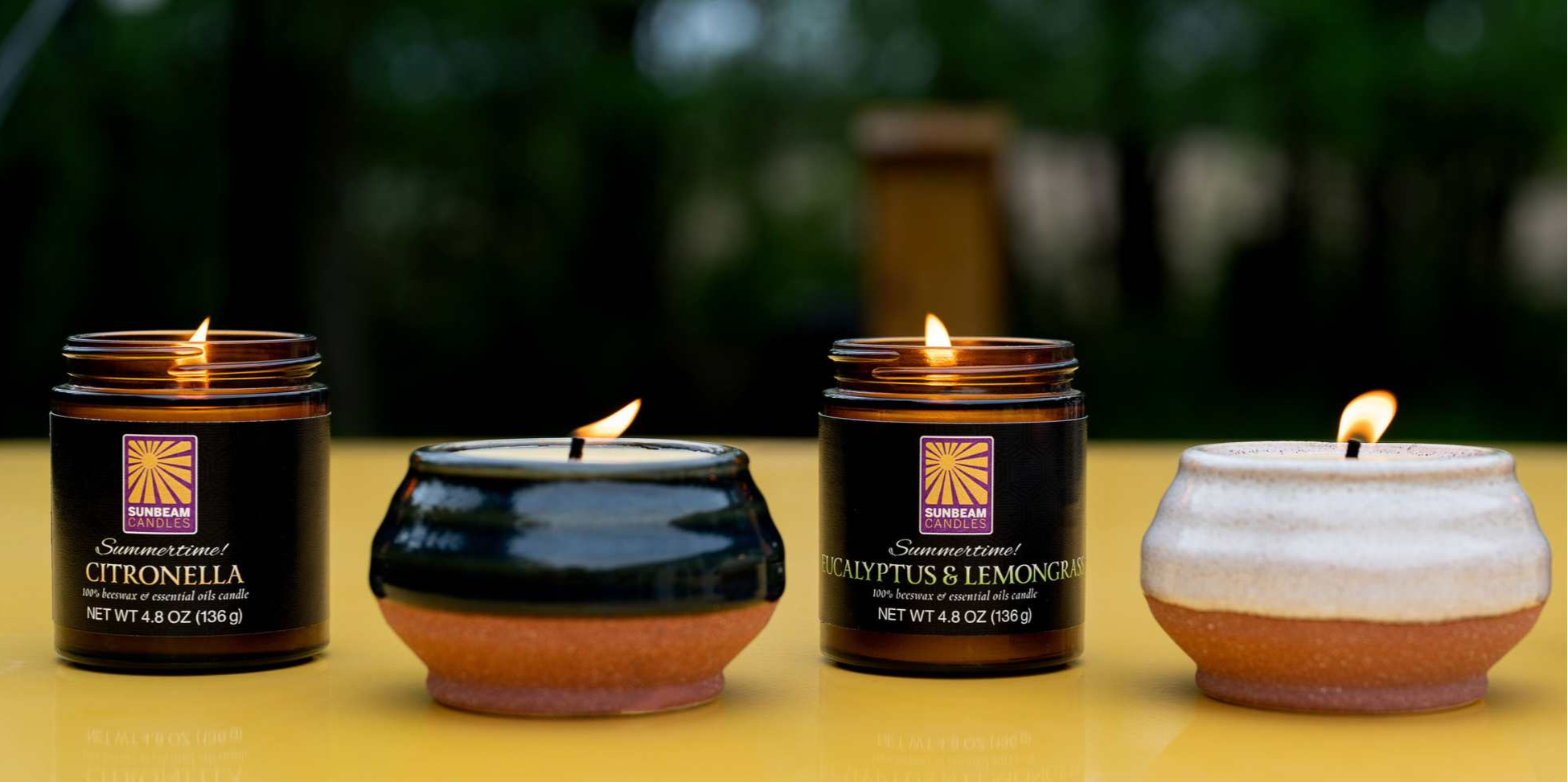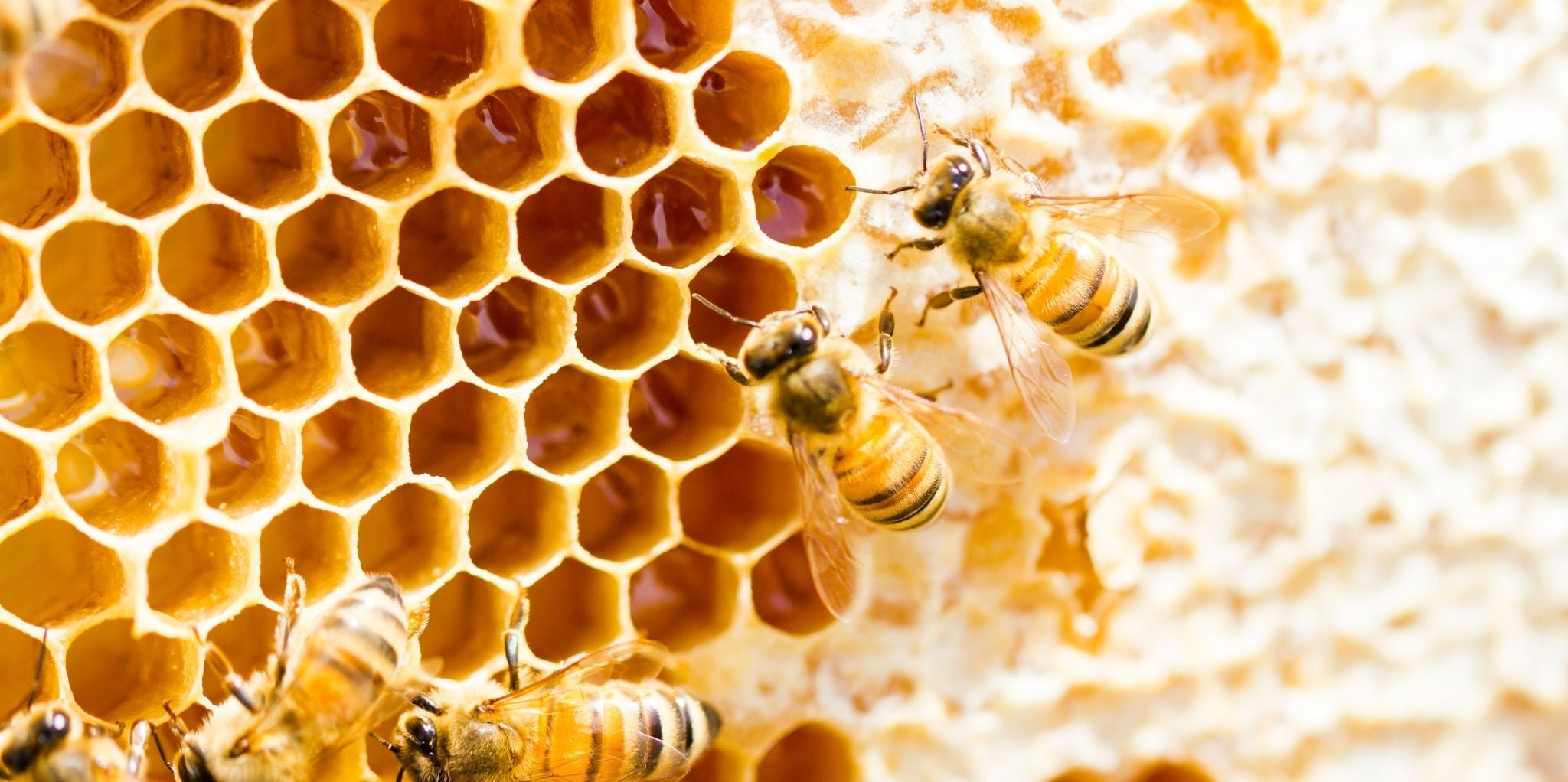
Natural Bug-Repellent Candles: What Essential Oils Actually Work?
As warmer days return and we head outdoors for dinners on the porch, quiet evenings in the garden, and weekend camping trips, we're also greeted by less-welcome guests: mosquitos, gnats, and other buzzing pests. If you're anything like us, you're probably looking for a solution that's as effective as it is natural.
That's where natural bug-repellent candles step in. They are a beautiful, functional way to reclaim your space while staying true to your values.
But not all essential oils are created equal when it comes to keeping bugs at bay. Let's explore which ones really work, how to use them, and why candles made with purpose and integrity make all the difference.
The Buzz Around Natural Bug Repellents
Why Choose a Candle Over a Spray?
Spray have their place, but they often come with sticky residues, synthetic fragrances, or harsh chemicals. Candles, on the other hand, offer a passive and pleasant way to diffuse protective essential oils through the air, creating an invisible shield around your space.
Sustainability and Simplicity in Action
Natural candles made from beeswax or other plant-based waxes provide a toxin-free alternatives to synthetic repellents. Plus, they add beauty and ambiance to your space while doing double duty as a functional tool.
How Do Essential Oils Repel Insects?
The Science Behind the Scents
Certain essential oils contain natural compounds that disrupt how insects locate food, mates, or hosts (like us). Insects rely heavily on their sense of smell, especially through pheromone systems, which are like internal chemical messengers that guide their behavior.
These systems help bugs detect where to feed, where to breed, and even where to nest. Oils like citronella and eucalyptus interfere with this process. They essentially "jam" the insect's scent receptors, making it harder for them to follow the trails that usually lead them to human skin or standing water.
For example:
-
Citronella contains geraniol and citronellal, which confuse mosquitos' olfactory systems.
-
Eucalyptus and peppermint emit strong, volatile aromas that override natural attractants.
- Lemongrass is rich in citronellal, which disrupts mosquito scent detection and deters other flying pests.
By breaking this chain of chemical communication, essential oils help keep bugs confused, disorientated, and at a distance.
Top Essential Oils That Actually Work

Citronella - The Classic Defender
Perhaps the most well-known natural insect repellent, citronella oil comes from a grass in the lemongrass family. It's been shown in multiple studies to reduce mosquito landings significantly, making it a staple for outdoor candles.
🟢 Best for: mosquitos, flies
🟢 Scent profile: fresh, lemony, herbaceous
Eucalyptus - Sharp, Fresh, and Effective
Eucalyptus oil, has gained popularity for its strong performance against biting insects. It's even recognized by the CDC as a proven natural repellent when used in concentrated form.
🟢 Best for: mosquitos, ticks
🟢 Scent profile: minty, clean
Lemongrass - Light but Potent
A key part of many summertime bug-repellent blends, lemongrass oil has a high citronellal content that helps confuse mosquito scent receptors. It offers a bright, citrusy top note and pairs especially well with eucalyptus.
🟢 Best for: mosquitos, gnats, no-see-ums
🟢 Scent profile: citrusy, grassy, fresh
Peppermint - Not Just for Cooling Off
Beyond its refreshing aroma, peppermint oil deters ants, spiders, mosquitos, and flies. Its menthol content offers a cooling sensation that insects don't enjoy.
🟢 Best for: ants, spiders, flies
🟢 Scent profile: crisp, cooling, sweet
Lavender - Gentle but Mighty
While you might associate lavender oil with calm and relaxation, its also surprisingly effective against insects like moths and mosquitos, especially when blended with stronger oils.
🟢 Best for: mosquitos, moths
🟢 Scent profile: floral, soothing, herbaceous
Citronella vs. DEET: How Do They Compare?
Let's keep it real. DEET is powerful, but it comes with concerns about skin irritation, environmental harm, and overuse. Citronella candles, when made with high-quality ingredients, offer a safe and natural alternative. While they may not last as long as DEET, they can be refreshed easily and don't introduce harsh chemicals to your body and environment.
Why Candles Are a Conscious Choice
No Aerosols, No Harsh Chemicals
With candles, you're choosing a gentler form of repellent that doesn't pollute the air, your lungs, or harm local ecosystems. Especially when made from natural waxes like beeswax, you're lighting something that supports the health of both people and the planet.
Eco-Friendly, Artful, and Functional
Let's not forget, they're beautiful too. Unlike plastic bug zappers or synthetic sprays, a natural candle adds warmth, glow and intention to any gathering.
Best Uses for Bug-Repellent Candles
Outdoor Dining and Porches
Keep mealtime relaxing and bug-free by placing candles around outdoor tables, patios, or balcony railings. The soft glow adds ambiance, while essential oils help to create a natural barrier that keeps mosquitos away without sprays or swatting.
Camping and Glamping

A natural candle is a campsite essential for those who want comfort and calm without chemical repellents. Place it on a picnic table or near your seating area to help keep bugs away from the fire pit or dinner prep area. Never burn candles inside a tent.
Gifting with Intention
Bug-repellant candles make thoughtful gifts for anyone who enjoys spending time outside. They're practical, naturally made, and show you care about comfort and sustainability.
Candle Care Tips to Maximize Repellent Power
Burn Time, Placement and Wind Considerations
Let the candle burn long enough for the wax pool to fully melt across the top. This ensures that the essential oils diffuse evenly. Keep away from strong winds to prevent the flame from flickering out or the essential oils from dispersing too quickly.
How to Store Between Uses
Store candles in a cool, dry place away from sunlight to preserve the potency of the oils. Cover them when not in use to retain their scent.
Are Essential Oil Bug-Repellant Candles Safe for Pets?
Essential oils may be natural, but that doesn't always mean they're safe for every member of the household. Some commonly used bug-repelling oils - including citronella, eucalyptus, and peppermint - can cause sensitivity in animals, especially cats and small dogs.
Although candles diffuse oils more gently than sprays or plug-ins, it's best to burn them in outdoor or well-ventilated spaces, and always keep them away from your pets' food and bedding areas.
When in doubt, consult your veterinarian before using any essential oil-based products around animals. It's the best way to stay safe while enjoying your candle with peace of mind.

Wrap-Up: Keep Bugs Out and Intentions In
Natural bug-repellent candles do more than keep insects away. They help create calm, welcoming spaces while avoiding harsh chemicals. Whether you're enjoying dinner outdoors, working in the garden, or spending time at your campsite after a day of adventuring, lighting a natural candle is a simple way to care for yourself and the world around you.
Explore our Summertime! Scents
Looking for a candle that smells amazing and helps keep the pesky bugs at bay? Our Summertime! Scents container candles are handcrafted with pure domestic beeswax and pure essential oils. Choose between Citronella or a Eucalyptus and Lemongrass blend. Perfect for porches, patios, camping and peaceful summer evenings.
FAQ
What bugs does citronella repel?
A: Citronella is most effective against mosquitos, but it can also help deter flies, gnats, and no-see-ums. It works by masking scents that attract these insects making it harder for them to find you.
Are bug-repellent candles safe for pets?
A: Some essential oils used in these candles - like citronella, eucalyptus, and peppermint - may irritate pets, especially cats and small dogs. Use them outdoors or in a well-ventilated area, and check with your vet if unsure.
How long do bug-repellent candles last?
A: It depends on the size, ingredients, and how you burn them. Beeswax candles burn longer than soy or paraffin, and properly storing your candle between uses will help preserve it's scent and effectiveness. Our popular citronella amber glass jar candles burn for 30 hours.
Can I use these candles indoors?
A: Yes, as long as the space is well-ventilated. Just be aware that essential oils can be strong in small or enclosed areas, so it's best to use them in open rooms or near windows.
Do essential oil candles really work?
A: They can be effective when made with the right oils and used correctly. While they may not offer the same strength as synthetic sprays, they provide natural protection without the chemical load.




Leave a comment
This site is protected by hCaptcha and the hCaptcha Privacy Policy and Terms of Service apply.